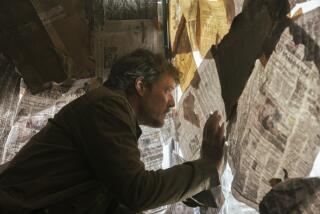Review: ‘Mozart in the Jungle’ on Amazon gets good after woeful pilot
- Share via
All that follows the first several paragraphs of this review will constitute an endorsement, so I encourage you to keep reading past the negative opening remarks, as I would encourage you to keep watching “Mozart in the Jungle,” whose first season begins Tuesday on Amazon, past its so-so, sometimes off-putting pilot. It gets good thereafter — very good.
The 10-episode series, which comes from executive producers Roman Coppola, Jason Schwartzman and Alex Timbers — who wrote the pilot, as well — is based on oboist Blair Tindall’s 2005 book of the same name, subtitled “Sex, Drugs, and Classical Music.” Part memoir, part institutional analysis, it largely relates Tindall’s adventures in the New York music scene of the 1980s and 1990s, where, you may be surprised to know, classical musicians carried on like other New Yorkers in those years. (See subtitle, above.)
The sex, or the humorous suggestion thereof, begins at the beginning, the camera close-up on a woman’s mouth as she says, “It’s easier with the lips slightly wet.” This is Hailey (Lola Kirke); she is giving an oboe lesson to a 12-year-old boy, who later sends a text to reinforce the obvious metaphor.
Hailey is that figure familiar to stories of the wicked stage, the wide-eyed naif come to find fortune and creative fulfillment in the big city. She is the author, sort of, spruced up.
Substituting in a Broadway pit orchestra, she meets cellist Cynthia (Saffron Burrows), who takes Hailey under her wing in order to introduce her to the other characters and get her closer to the main action. This takes place around the fictional New York Symphony, where old maestro Thomas (Malcolm McDowell) is being kicked upstairs into an empty title to make room for new maestro Rodrigo (Gael García Bernal), a curly haired, feral, foreign wunderkind.
Possibly someone was thinking a little of Gustavo Dudamel in creating him. Chairwoman of the Board Gloria (Bernadette Peters) stands between them. I mean, it’s a cast.
Yet the pilot feels at once overdone and underfunded. It wants to shock us, a little, which is never a good way to start.
Everything feels a little too obvious, the characters a conglomeration of clashing attitudes rather than a collection of real people whose spite might be mixed with respect — or, more to the point, perhaps, whose respect might, nevertheless, contain a little spite.
Small things rankle. The orchestra looks too young, the spaces where poor musicians live — the show is set in the current Manhattan real estate market, not the 1980s’ — are too big. The pilot tries a little too hard to live up to the book’s subtitle.
But that’s what pilots are for, partly — to find out what doesn’t work. Once the series is out on open water and the course is adjusted, things start to improve.
Characters who were mouthpieces for attitudes start to seem like people, more complicated than a thumbnail description can accommodate. You grow interested in what will become of them without expecting or rooting for any particular outcome.
Indeed, there doesn’t seem to be any standard narrative playing out, just a web of interconnected small stories — about work, love, the financial health of the orchestra and the making of art. (It comes to resemble, not unfavorably, the great Canadian series “Slings and Arrows,” about a perennially, not abnormally beleaguered Shakespeare festival.)
The portrayal of the milieu and its mechanics grows convincing. I can’t say how accurate it is — some of it accords with Tindall’s book, at least, though I can’t say how accurate that is, either — but, more to the point, it feels right. You stop thinking about what seems far-fetched and start nodding with interest.
The pushy tone of the pilot relaxes into a kind of dreamy naturalism. The sex and drugs fade into the fabric of the piece — more important, there is music to make and an orchestra to run.
There is some backing out of unprofitable avenues. Schwartzman drops in to play a journalist, which feels a bit like a rescue mission, but he’s very funny and provides just the right amount of lift.
New characters are introduced, most profitably Debra Monk as Betty, an older oboist who at first looks at Hailey askance, but her character too grows richer as the series proceeds. (I am really looking forward to its second season.)
And not only do the characters come into better focus, but the places where they work and live feel right, and look right, as the series becomes a world. The pushy tone of the pilot gives way to a kind of detailed yet dreamy naturalism, and the action moves out into the city and beyond.
More to Read
The complete guide to home viewing
Get Screen Gab for everything about the TV shows and streaming movies everyone’s talking about.
You may occasionally receive promotional content from the Los Angeles Times.







